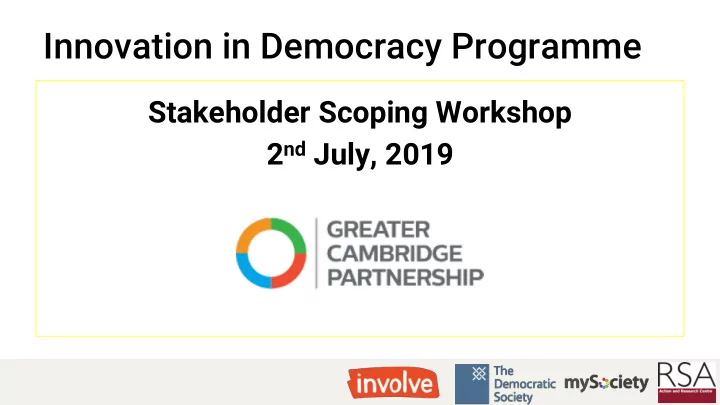

Innovation in Democracy Programme Stakeholder Scoping Workshop 2 nd July, 2019
The Innovation in Democracy Programme “...To pilot participatory democracy approaches, whereby people are empowered to deliberate and participate in the decisions that affect their communities…. “ The government will work with local authorities to trial face-to-face deliberation complemented by online civic tech tools to increase broad engagement and transparency.” Civil Society Strategy, August 2018 • GCP one of 3 projects chosen Dudley Borough Council, Test Valley Borough Council and Greater Cambridge Partnership • £60,000 to enable the Citizens’ Assembly to happen
Who we are Involve - public participation charity with a mission to put people at the heart of decision-making The Democratic Society - non-profit organisation working for greater participation and dialogue in democracy mySociety - non-profit social enterprise providing technology, research and data that help people to be active citizens The RSA - a charity that aims to find practical solutions to social challenges
Introduction to Citizens’ Assemblies
What is a Citizens’ Assembly? Members of the public are brought together to discuss an issue, and reach a conclusion about what they think should happen. • They learn in depth about an issue, hearing from expert witnesses & discussing with people from all walks of life. • Together, they reach a collective decision/ set of recommendations.
How members are selected ● Citizens are chosen at random to take part ● But they’re often also selected to be demographically representative of the wider population, to make a “mini - public”. It looks and feels like a miniature version of the wider public.
What happens during a citizens’ assembly? 1/2 All citizens’ assemblies go through 3 stages: 1. Learning - participants hear from witnesses. These often include technical experts and lived experience experts. 2. Deliberation - participants consider what they have learnt, individually and in conversation with their fellow participants. 3. Decision-making - participants reach a collective decision or set of recommendations. This can be through a vote and/or consensus building process.
Key features • Balanced information • Expert witnesses • Time for deliberation • Neutral facilitation • Collective decision making on recommendations
This process is different ● Recommendations are made by assembly members, not by politicians or officers ● The result is determined by a carefully facilitated process ● Length of time for understanding and deliberation ● Representativeness of assembly members
The Question How do we reduce congestion, improve air quality, and provide better public transport in Greater Cambridge?
Recruitment – the Assembly Members • Working with the Sortition Foundation to recruit members • 10,000 invitations being sent out in July – people register interest • Selection using stratified, random selection - Assembly is broadly representative of Greater Cambridge society. • c. 50+ members – from age 16+ • Random not self-selecting Assembly Members
Stratification – Assembly Members • Basic demographic criteria: (Usually) Age / Area / Ethnicity / Gender / Socio-economic group; • One or two additional criteria depending on the topic: • Frequency of travel • Mode of travel • Population wide statistics must be available.
How else can people take part / keep informed ? ● Using Consult Cambs as portal for information – before, during & after ● Asking for views on what issues the Assembly should consider ● Asking for “travel stories” to reflect wider views ● Some might be asked to present evidence ● Observer places available ● Live stream of presentations
Advisory Group Role ● Advice and oversight to review the assembly’s plans, evidence and materials are balanced and unbiased ● Members currently being approached - Public health; Environment; Public realm; Transportation; Social equalities; Economic growth; Democracy ● Focus on independent expertise on the topics ● Likely to meet twice before the Assembly
Evidence • Includes technical experts to provide factual background information Key stakeholders with a range of policy • preferences & l ived experiences Seek to also respond to what Assembly • members want to hear about
Next Steps Date Activity Stakeholder workshop (2 nd July) to update and start scoping ● July evidence ● Recruitment letters sent out and Citizens’ Assembly Members recruited ● Councillor Briefing Sessions at County, City and South Cambs ● Consult Cambs Question – evidence scoping ● First Meeting of Advisory Group ● On boarding of Citizens’ Assembly Members August ● Consult Cambs Question – travel stories ● Second meeting of Advisory Group ● Observer invitations /selection ● First meeting of Citizens’ Assembly 7/8 September ● Second meeting of Citizens’ Assembly 5/6 October ● Report from the Citizens’ Assembly October ● November/ Paper to Joint Assembly / Board December
Recommend
More recommend